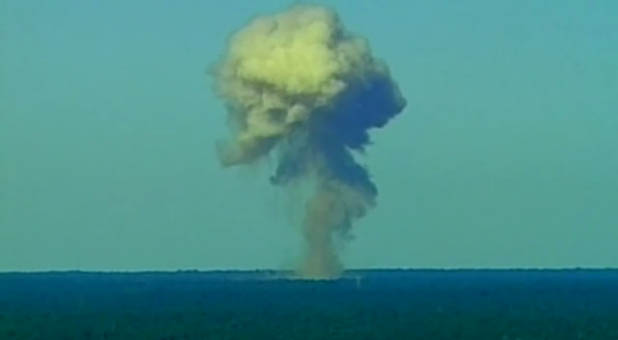‘MOAB’ Gets Its Combat Debut Against ISIS in Afghanistan
The GBU-43/B Massive Ordnance Air Blast Bomb is the largest conventional (non-nuclear) weapon in the world.
Measuring 30 ft. long and weighing more than 21,000 lbs.—containing about 10 tons of high explosive—it easily earned the designation “Mother Of All Bombs” following its first test detonation in 2003. But, until Thursday, it had never actually been used in combat.
Thursday afternoon, U.S. Forces Afghanistan announced it dropped the laser-guided bomb on the headquarters complex of the ISIS faction now operating in the Achin district of the eastern Nangahar province. Upon detonation, the “MOAB” would have created a fireball one mile in radius that creates “shock and awe” by creating a mushroom cloud similar to a small nuclear detonation—without any of the harmful radiation.
The bomb was likely dropped from an MC-130 Talon aircraft. The GBU-43/B was initially developed to destroy heavily fortified underground enemy bunkers. See the video above for a brief overview of its development and capabilities.
The following is the military statement regarding the bombing:
At 7:32 p.m. local time today, U.S. Forces-Afghanistan conducted a strike on an ISIS-K tunnel complex in Achin district, Nangarhar province, Afghanistan, as part of ongoing efforts to defeat ISIS-K in Afghanistan in 2017.
The strike used a GBU-43 bomb dropped from a U.S. aircraft. The strike was designed to minimize the risk to Afghan and U.S. forces conducting clearing operations in the area while maximizing the destruction of ISIS-K fighters and facilities.
“As ISIS-K’s losses have mounted, they are using IEDs, bunkers and tunnels to thicken their defense,” said General John W. Nicholson, Commander, U.S. Forces – Afghanistan. “This is the right munition to reduce these obstacles and maintain the momentum of our offensive against ISIS-K.”
U.S. Forces took every precaution to avoid civilian casualties with this strike. U.S. Forces will continue offensive operations until ISIS-K is destroyed in Afghanistan. {eoa}




























































